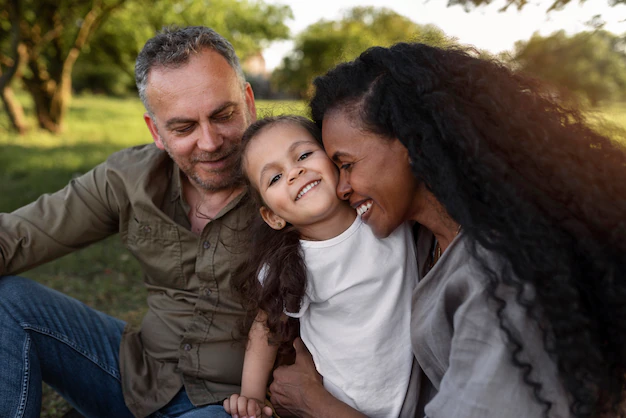I was talking to someone about how I had never been envious of anything, but one thing used to bother me. That one thing was family. I saw how different families interacted with one another in a way that didn’t result in yelling, threatening, or shutting them down. I saw other children given the privilege to talk to their parents about anything whether it be personal or them discussing the parent’s parenting. Although some of those children would come off as disrespectful, some did not, and their parents listened. I was not given the privilege to talk to either of my parents about anything that was on my mind concerning them or certain topics about myself.
As a child, I would try to voice my opinion to my parents to let them know how they made me feel. I would get whooped, yelled at, and shut down to a level so low I felt invisible and alone. I was never allowed to voice my opinion. That made me hate them. I told myself that if I ever had children, I would never take their voices away, especially if they came to me in sincerity or pain. My son Brian, 8, comes to me all the time about how he feels. Whether his feelings are about me or how he is feeling at the moment, I listen. I am not offended. I understand and respect the fact that he is bold enough to speak up about his emotions, even if it’s me causing the emotional distress.
From ages 2-7, I yelled at my son. I yelled when he did something I didn’t like and when I was having a bad day. Why? Not because I wanted to. I felt shame every time I did. I yelled because of the generational curse set before me. My mom yelled at me, and her mom yelled at her. I don’t know where it started, but I told myself it was going to end with me! In July of 2023, a month after salvation, I went out to get my son a Happy Meal from McDonald’s. I felt this urge to apologize to him, which was something I had never done before. I said to him, “Hey Brian, I am sorry for all those years I yelled at you and hurt your feelings. My mind was not in a good space. Do you accept my apology?” Brian began to cry.
While driving 5 minutes away from the restaurant, I repeatedly asked him why he was crying, but he remained silent. As we pulled into the restaurant and approached the drive-thru, I asked one last time. Brian said to me, “I’m crying because you’ve never apologized to me before.” That crushed me. To this day, I think about that drive and what my son said to me. I am happy that I received deliverance from a hardened heart. I was so evil and nonchalant before I got delivered. Parents, listen to your children. Your children have a voice. Even as your children grow older, listen to them. The verbal abuse that some children receive from parents is downright disheartening.
Ephesians 6:2-4 reads, “Honor your father and mother. This is the first commandment with a promise, that it may go well with you and that you may live long in the land. Fathers, do not provoke your children to anger but bring them up in the discipline and instruction of the Lord.” I hear a lot of parents talk about verses 2 and 3 while taking it out of context to use as a “controlling mechanism” against their children. I never heard a parent read verse 4. That controlling spirit in them looks past it. You should not provoke your children to anger and then expect them to honor you. That is not how that works. Treat people how you want to be treated, including your children.
Here is a list of verbal abuse (overt/convert) some parents use toward their children:
1. Yelling
2. Name-calling or belittling
3. Threatening/frighting them
4. Using control or status to make them feel inferior
5. Taking away their right to use their voice
6. Gaslighting
7. Hypercriticizing
8. Mocking
9. Ignoring
10. Not supporting/acknowledging/loving
Even silence is a form of verbal abuse.
Do these things instead:
1. Talk to them in a gentle manner
2. Ask them what is bothering them and be open to hearing them. If your child does not want to open up to you, try therapy or counseling.
3. Create a safe space for them to be able to come to you about anything
4. Let your child know that there are better ways to resolve conflict
5. Set an example for your child. After all, you are an adult and should be leading by example.
When talking to your children, remember the fruits of the spirit: love, joy, peace, patience, kindness, goodness, faithfulness, gentleness, and self-control. There will be times when you and your child have disagreements, but as parents, we should show them a better way. If you don’t have the fruits of the spirit, don’t expect your child to. Most of how a child evolves has everything to do with the parents. Although there are a few exceptions, the majority are parenting and the environments they were raised in.
Children will begin to normalize verbal abuse and other abusive behaviors. The way you raise your child or treat them will have a major effect on how they view themselves or how they view others. It can have a long-term effect on the child up until the child becomes an adult, causing them to push the same behavioral patterns and traits of abuse onto their children or other people they are relational with. Abuse can cause your child to hate you and others. I don’t want to go into full detail on the effects that abuse can have on a child but rather inform abusive parents about the dangers that come with it. Some children didn’t receive or feel love as a child, so when they became adults, they couldn’t love their children, their spouses, or themselves properly.
Children should respect their parents as well. Sometimes a parent can do their best, but their child still rebels. In that case, prayer and therapy are helpful. There’s always a root cause to things, and we should help search for it. Being nonchalant toward your child is wrong. Even if your child rebels, you should treat them well. I am not saying tolerate their behavior, but I am suggesting that you continue to show them love regardless. Think about the parable of the prodigal son in (Luke 15:11-32). It teaches an example of God’s character towards us when we go astray but later come back to our senses. God doesn’t reject us. Instead, He waits and welcomes us with open arms as we return. We should treat our children the same way, regardless of their age.
Here is a list of things parents should stop doing when their child becomes adults:
1. Stop overstepping boundaries
2. Stop giving unsolicited advice
3. Don’t tell them how they should think or feel
4. Stop approaching them like you are superior (only God is superior)
Do these things instead:
1. Check in on them
2. Try to mend whatever is broken
3. Encourage them
4. Support them
Seek therapy or counseling if you’ve experienced any form of child abuse. More than anything else, seek the Lord. Healing can come from both sources, but Jesus is the ultimate source of healing. Forgiveness and restoration are essential and possible between a child and a parent. I encourage parents to shower their children with love. You do not have to treat them how your parents might have treated you. “Children are a heritage from the LORD, the fruit of the womb a reward.” (Psalm 127:3) Our children did not ask to be here, so it is our job as parents to train them up in the way they should go (Proverbs 22:6). Break the generational curses and begin a new way of parenting.


Hey people!!!!!
Good mood and good luck to everyone!!!!!